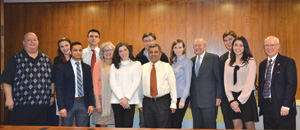Pace Economics Team Captures Second Fed Reserve College Title

Pace University may not yet have won a national championship on the athletic fields but it just scored an impressive repeat victory in the classroom.
Members of the school’s economics team ended the fall semester with its second consecutive national championship at the 12th annual national College Fed Challenge, besting some of the most prestigious universities in the nation.
The competition is sponsored by five of the 12 banking districts in the Federal Reserve System, which have regional competitions every fall, said Economics Professor Mark Weinstock. Pace has won its region four straight years, he said.
“There are 30 or 40 schools which compete in Round One and are progressively eliminated. Only two schools go to the finals to get a regional champion in each district,” Weinstock said.
The regional champions met in Washington D.C. on Dec. 2, where the Pace team defeated Northwestern, Princeton, Bentley College and the University of North Carolina, which placed second. Last year’s team defeated Princeton to win first place.
Students are required to put together a 15-minute PowerPoint presentation on the current U.S. economic and financial conditions and the strength, weaknesses and threats to the market system. The presentations are made before the judges, who are Federal Reserve board members.
“At the end of the presentation, the team has to make a recommendation to the Fed on what they should be doing regarding monetary policy,” Weinstock said. “Once that presentation is completed, they have 15 minutes of Q&A with the judges, which can be on economics or monetary policy or banking, regulation, unemployment, inflation or something in the presentation that the judges want to see if they really thought clearly about.”
All seven members of this year’s Pace team are economics majors in Pace’s Dyson College of Arts and Sciences. Team members are Katherine Craig, Daniella Gambino, Omar Habib, Jozef Lampa, Melissa Navas, Jonathan Okane and Yuliya Palianok. Weinstock and fellow economics professor Greg Colman serve as advisers, training the team during the year and helping them prepare their presentation.
“We go through, literally, hundreds and hundreds of questions and responses to make sure they are prepared with all the different nuances of what they need to know,” Weinstock said.
Students are also expected to read The Wall Street Journal and The Economist as well as speeches and research papers by economists, bank presidents and governors.
Pace Economics Department Chairman Joseph Morreale said creativity and teamwork are crucial.
“Many of the teams that compete don’t operate in such a teamwork fashion,” he said. “I think that’s a benefit of having two faculty working with them for so long. They usually spend five or six months preparing them. It’s a long haul that starts in the summer.”
The Pace Economics Department has grown in popularity in recent years and now has about 200 economics majors, Morreale said. Students can specialize in business economics, public economic policy and Chinese Economic Studies, which includes travel courses to China. Students are required to prepare a senior thesis.
Economics majors often seek jobs in financial institutions, healthcare organizations or the nonprofit sector, while some have accepted positions in the Federal Reserve itself, Morreale said. Starting salaries for graduates range from $60,000 to $80,000 a year, he added.
Students looking to major in economics should take a math sequence, including pre-calculus and calculus, and the Advanced Placement macroeconomics and microeconomics half-year classes. Students who achieve at least a 3 of 5 on the AP test earn college-level credit, Morreale said.
“I’ve always argued that they should also take world history because they have to understand the new economy of the world. It’s not just being a national economy anymore,” he said.

Examiner Media – Keeping you informed with professionally-reported local news, features, and sports coverage.
